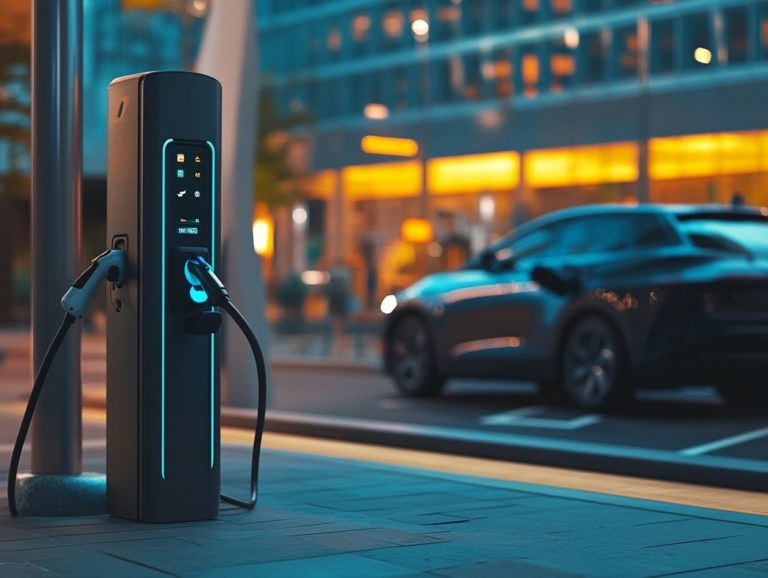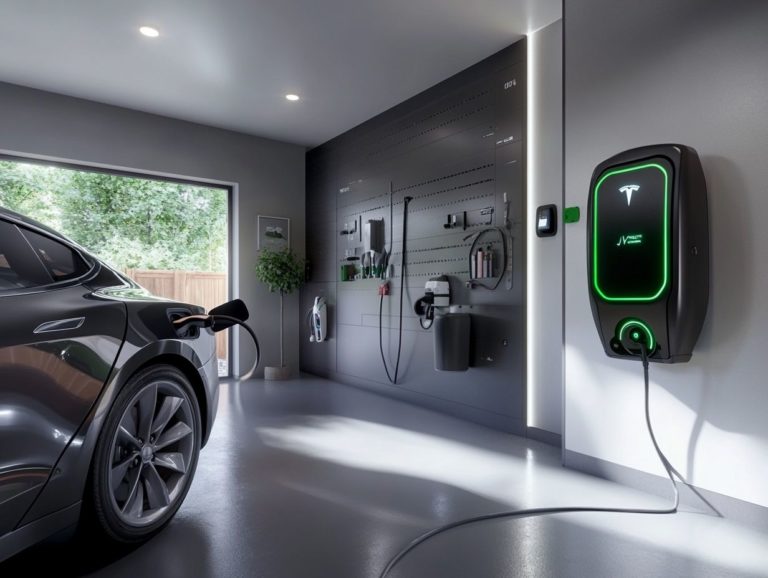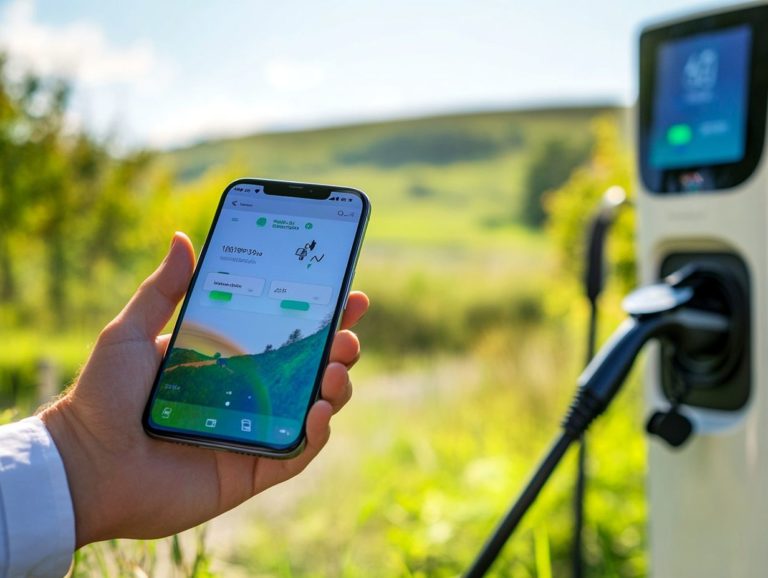Future Innovations in EV Charging Solutions
Are you ready to join the electric vehicle revolution? The electric vehicle (EV) revolution is in full swing, but your journey toward embracing widespread adoption largely depends on the state of EV charging.
This article takes you through the various types of charging available today, shedding light on their limitations and the significant challenges you re likely to encounter, such as infrastructure gaps and cost issues.
It also explores innovative solutions like wireless technology and ultra-fast charging that have the potential to reshape the landscape.
By grasping these dynamics, you can gain a deeper understanding of how they may influence EV adoption and what the future holds for advancements in charging technology.
Contents
- Key Takeaways:
- The Current State of EV Charging
- Challenges in EV Charging
- Potential Impact on EV Adoption
- Future Possibilities and Developments
- Frequently Asked Questions
- Curious about the future of EV charging?
- What are some future innovations in EV charging solutions?
- How does wireless charging work for electric vehicles?
- Will mobile charging units become more common in the future?
- What is ultra-fast charging and how does it differ from regular charging?
- What are the benefits of future innovations in EV charging solutions?
- Will there be more sustainable options for EV charging in the future?
Key Takeaways:
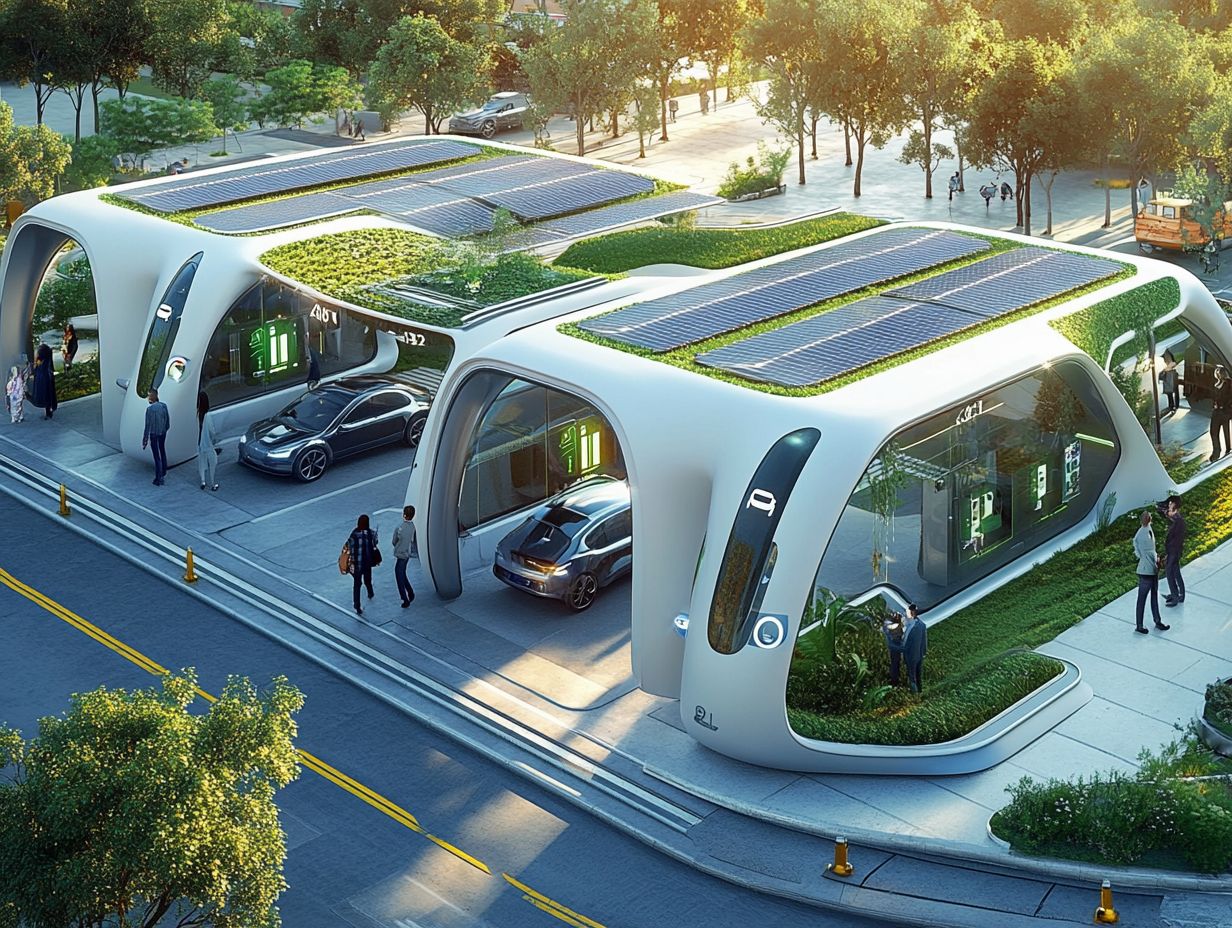
- Wireless charging technology offers a convenient and efficient solution for EV charging.
- Smart grid systems help manage energy use more efficiently.
- Advancements in battery technology are crucial for the adoption of EVs.
The Current State of EV Charging
The landscape of EV charging is changing rapidly. A surge in electric vehicle (EV) adoption is driving this momentum, fueled by a growing focus on sustainability and renewable energy.
As the electric vehicle market continues to flourish, your need for a strong charging network becomes paramount. This network must accommodate a diverse range of EV models from Tesla to Ford to Nissan, and beyond.
Legislation in California is propelling this evolution, fostering the development of efficient charging networks. These networks enhance user experience and optimize energy management.
Exciting changes are paving the way for a cleaner and more sustainable future in transportation.
Types of EV Charging and Their Limitations
You ll find that there are various types of EV charging technologies, including standard charging, smart charging, and ultra-fast charging. Each has unique limitations that can influence your overall charging experience with electric cars.
Standard charging is often what you ll encounter at home or in workplaces, typically utilizing Level 2 chargers. These are faster chargers that offer moderate speeds, perfect for an overnight charge.
Smart charging systems enhance your convenience by allowing you to schedule charging times and optimize energy usage. This ensures you save costs during peak and off-peak hours. However, you might run into some compatibility issues if you re using an older EV model.
On the flip side, ultra-fast charging stations promise rapid replenishment, making them a great choice for long-distance travel. Yet, keep in mind that these stations aren t always universally accessible and can sometimes suffer from technological limitations.
All these elements are shaping the ever-evolving landscape of electric vehicle charging.
Challenges in EV Charging
Despite the remarkable surge in electric vehicle adoption, you still face numerous challenges in EV charging. These challenges impact both your experience and the broader infrastructure needed for widespread electric mobility.
Issues like inadequate charging infrastructure, accessibility hurdles, and the costs tied to implementing energy-efficient solutions present significant barriers to the growth of electric vehicle usage.
Infrastructure and Accessibility Issues
Infrastructure and accessibility issues pose significant challenges in the EV charging landscape, impacting both the rollout and efficacy of public charging stations and networks.
These obstacles highlight the urgent need for a more comprehensive network of charging stations to support the increasing number of electric vehicles on the roads.
Energy suppliers are pivotal in this transition, as they must evolve their distribution networks to provide a consistent and reliable power supply. Innovations such as vehicle-to-grid technology a system that allows electric vehicles to send energy back to the power grid offer promising solutions, enabling EV owners to return energy to the grid during peak demand.
This approach not only optimizes energy utilization but also fosters the expansion of charging infrastructure, making EV adoption a more viable option for many consumers.
Ultimately, addressing these related challenges is vital for a sustainable electric vehicle future.
Cost and Time Constraints
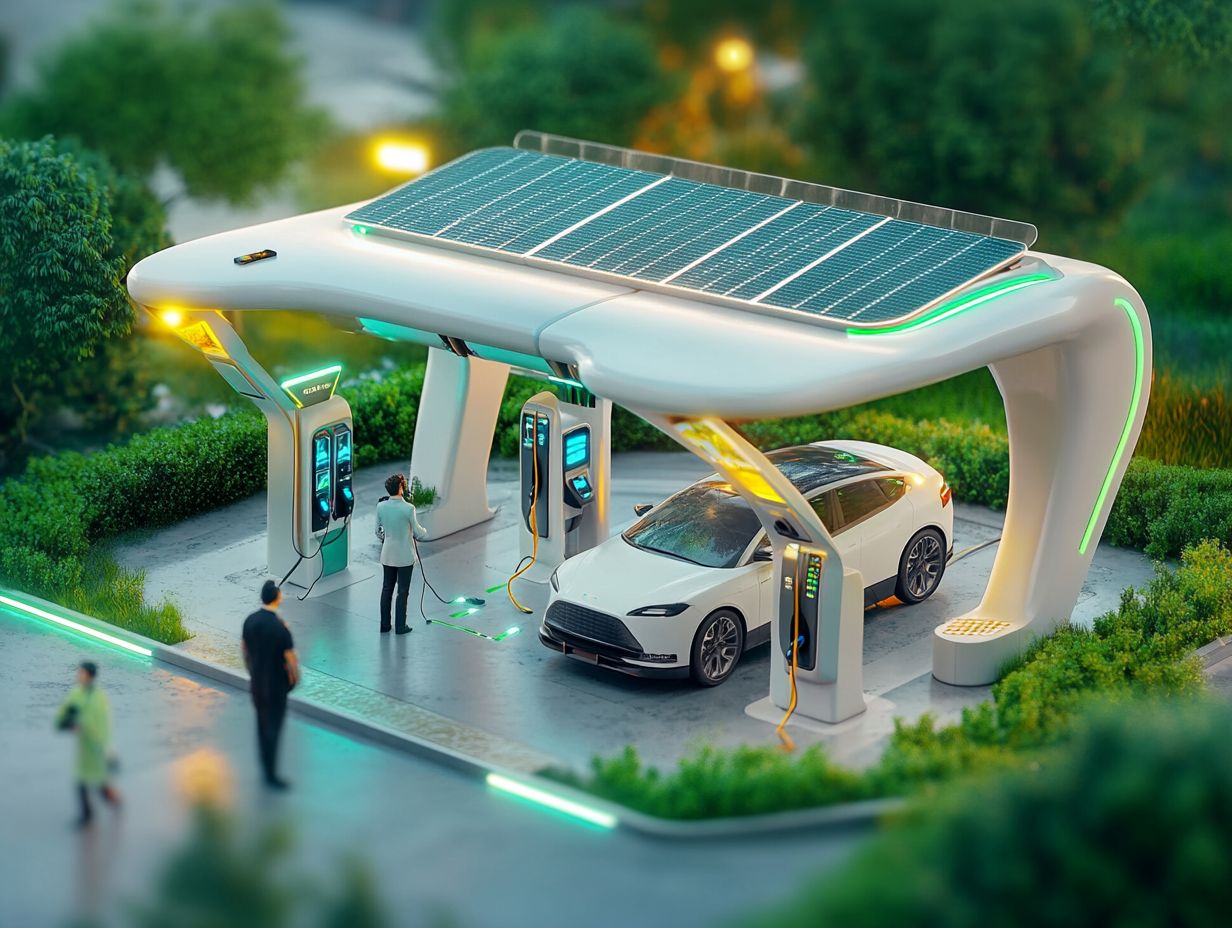
Cost and time constraints significantly influence your electric vehicle charging experience, shaping not only your personal decisions but also the wider market dynamics.
For many potential electric vehicle owners, the initial investment in charging infrastructure can be a daunting barrier. Ongoing energy costs and the time required for recharging may raise concerns about practicality.
However, innovations like solid-state batteries a new type of battery that offers longer life and quicker charging times are emerging, promising shorter charging times and extended ranges, which can ease some of these worries.
Energy management solutions that optimize charging schedules can help you minimize costs, transforming the experience into a more economical and efficient venture.
These advancements will change how you view electric vehicles and make them more appealing to a wider audience.
Innovative Solutions for EV Charging
Innovative solutions for EV charging are emerging at a rapid pace, harnessing advancements in charging technologies to elevate energy efficiency and user convenience, especially concerning the future of EV charging infrastructure development.
You’ll find smart charging, wireless charging, and ultra-fast charging among the exciting developments redefining the industry, including the latest developments in EV charging networks, all tailored to meet the growing demands of electric mobility.
Wireless Charging Technology
Wireless charging technology is transforming the EV charging landscape, offering you a convenient and efficient way to power your electric vehicle without the hassle of traditional cables.
This innovation significantly enhances your experience by removing the annoyance of plugging in, while also supporting smart charging solutions that optimize energy consumption according to demand.
As more electric vehicles become compatible with these systems, the potential for seamless integration into urban infrastructure continues to expand.
Imagine the ease of contactless payment options at charging stations, where all it takes is parking your vehicle to complete a transaction.
By embracing wireless charging, you re not just adopting a new technology; you re contributing to a more connected EV ecosystem that aligns with the broader goals of sustainable transportation and energy efficiency.
Smart Grid Integration
The integration of EV charging with smart grid technology is essential for enhancing grid stability and energy management, enabling a more efficient utilization of renewable energy sources.
This innovative approach transforms how you and your electric vehicle interact with the grid.
With seamless vehicle-to-grid (V2G) capabilities, not only can you charge your vehicle, but you can also send energy back to the grid during peak demand times.
By tapping into renewable resources like solar and wind, smart grids ensure that energy supply syncs perfectly with consumption patterns.
This dynamic management not only reduces costs for you as a consumer but also lessens the environmental footprint of traditional power generation methods.
As a result, your EV charging experience becomes far more versatile, giving you the power to actively contribute to a sustainable energy ecosystem.
Ultra-Fast Charging
Ultra-fast charging technology is a game-changer in the EV charging landscape. It dramatically cuts down the time it takes for your electric vehicle to recharge.
This advancement elevates your convenience and encourages wider adoption of electric vehicles. It eases range anxiety for potential buyers. You can charge your vehicle in as little as 15 to 30 minutes, making long journeys more feasible than ever.
The integration of ultra-fast charging stations into existing infrastructure boosts accessibility in both urban and rural areas.
As these stations become more common, they contribute to a more sustainable transportation ecosystem. This facilitates the transition toward a future powered by green technology.
Potential Impact on EV Adoption
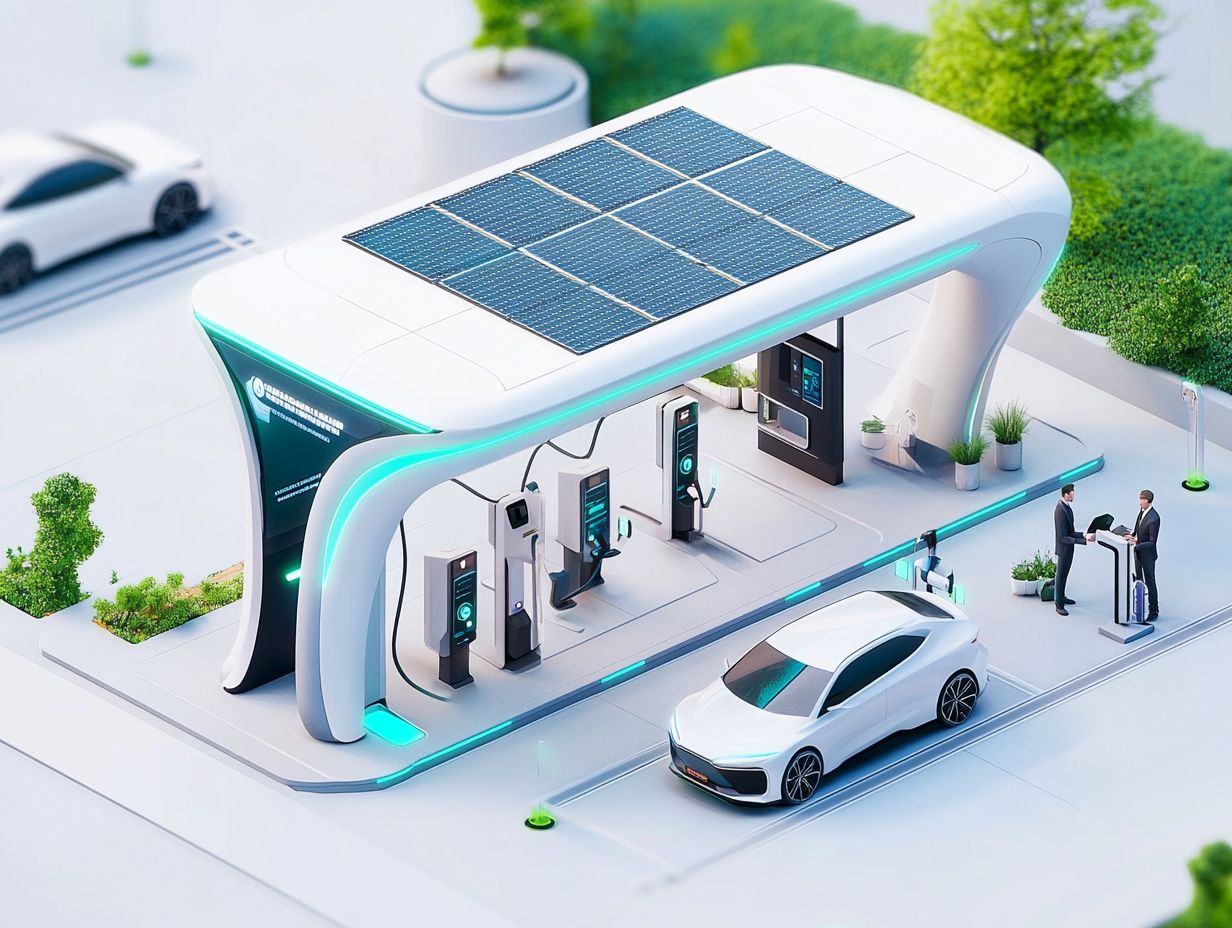
The impact of new ways to charge your car on electric vehicle adoption is substantial. Enhancements in the charging experience, along with a decrease in range anxiety, will significantly influence your decision to switch to an electric vehicle.
Improving Convenience and Reliability
Improving convenience and reliability in your EV charging experience is essential. It boosts your confidence and promotes the widespread adoption of electric vehicles.
As the infrastructure for electric vehicles evolves, innovations like smart charging solutions and more public charging stations play a crucial role. For the latest on EV charging technology, smart charging technology helps you optimize your charging times based on energy costs, ensuring a smooth and efficient process.
The thoughtful placement of public charging stations increases accessibility. You can confidently plan your journeys without worrying about running out of battery.
These advancements streamline your charging experience. They also cultivate a sense of trust and ease, making the transition to electric mobility more appealing than ever, especially as charging infrastructure is evolving globally.
Reducing Range Anxiety
Reducing range anxiety is crucial for promoting electric mobility. It addresses the primary concerns potential EV users have about charging infrastructure.
To tackle this issue, prioritize developing a robust and accessible network of charging stations tailored to various regions. Educating yourself about the different charging options, such as fast chargers and home solutions, can significantly alleviate concerns about running out of power.
Embracing innovative energy management systems empowers you to optimize your vehicle’s energy usage. This extends your range and improves charging efficiency.
By collaborating with government entities, private sectors, and consumers, you contribute to creating an environment that encourages the adoption of electric vehicles across diverse demographics.
Future Possibilities and Developments
Get ready! The future of EV charging is filled with exciting advancements in battery technology. Innovations like lithium iron phosphate and solid-state batteries are setting the stage for incredible changes, and for new EV owners, exploring the best charging solutions is essential.
The expansion of charging infrastructure is set to elevate the electric mobility landscape to new heights. This evolution not only enhances convenience but also ensures a more sustainable and efficient driving experience for you, especially with the latest innovations in EV technology.
Explore the latest charging stations near you today!
Advancements in Battery Technology
Advancements in battery technology, including innovations like solid-state batteries a new type of battery that is safer and more efficient and lithium iron phosphate, are pivotal for enhancing energy efficiency and the overall performance of electric vehicles.
These developments promise to extend the driving range of electric vehicles and significantly reduce charging times. This makes EVs far more appealing to a wider audience. As manufacturers embrace solid-state designs, the potential for lighter batteries that can provide more energy becomes increasingly tangible. This could result in vehicles boasting improved performance characteristics, such as quicker acceleration and superior handling.
By integrating cutting-edge battery management systems, you can optimize charging cycles, extending both lifespan and efficiency. Collectively, these advancements mark a crucial shift in how technology is tackling the challenges of sustainable transportation.
Expansion of Charging Infrastructure
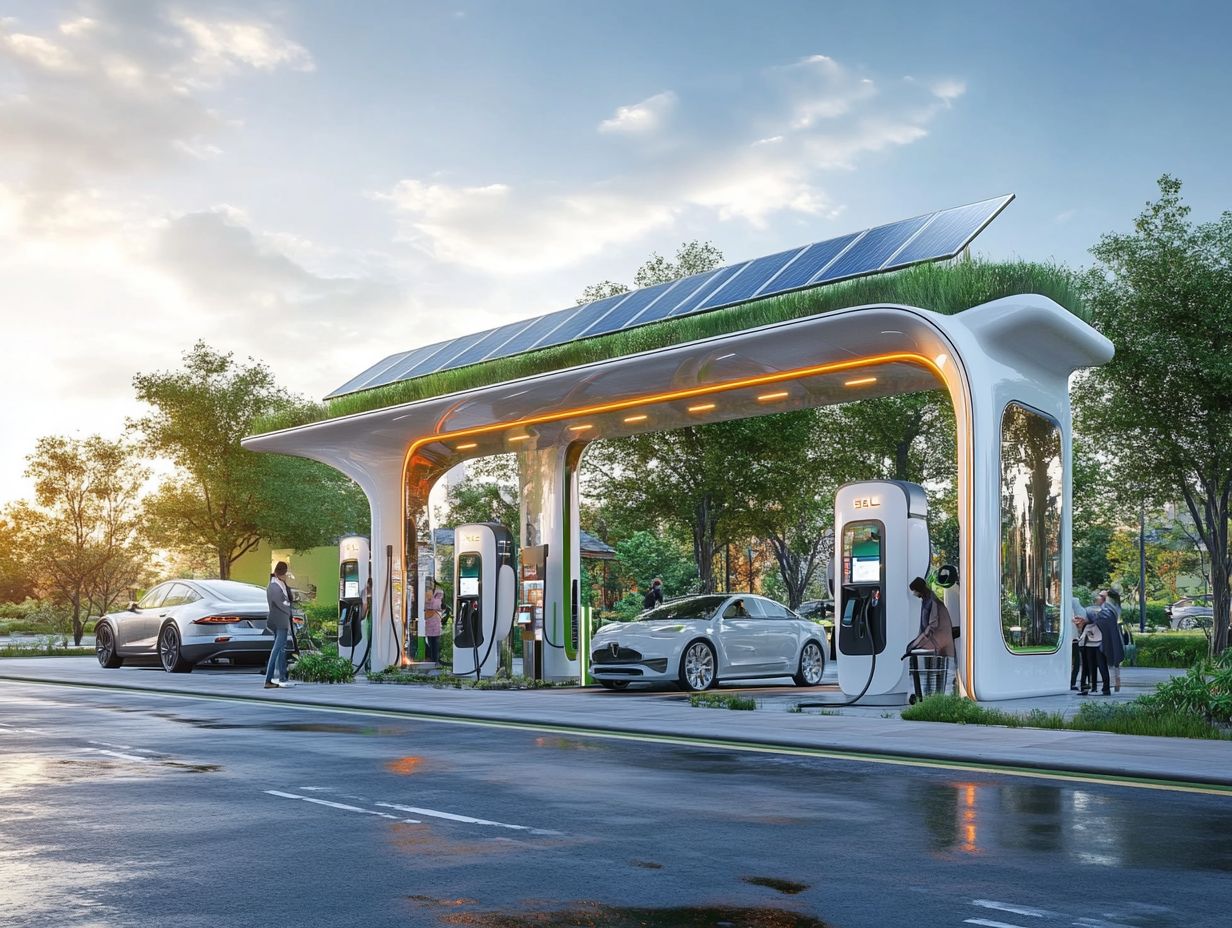
Expanding charging stations is exciting and crucial for all EV owners! It supports the rising demand for electric mobility and ensures public charging stations are accessible to all EV users.
As you transition to an electric vehicle, the necessity for a reliable and expansive network of public charging stations becomes increasingly clear. This network is vital to ease range anxiety for new EV owners, paving the way for wider adoption of sustainable transportation solutions. Public charging stations are essential in this ecosystem, providing convenient access to power in urban areas, along highways, and at popular destinations.
By fostering partnerships between governments, the private sector, and utility companies, we can significantly enhance the charging infrastructure, as detailed in how charging infrastructure is evolving globally, ensuring it meets current demands while anticipating future growth in electric mobility. With innovation and investment, we can create a seamless and efficient charging experience, contributing to a greener future.
Frequently Asked Questions
Curious about the future of EV charging?
What are some future innovations in EV charging solutions?
Some future innovations in EV charging solutions include wireless charging, mobile charging units, and sustainable EV charging solutions like ultra-fast charging stations.
How does wireless charging work for electric vehicles?
Wireless charging uses magnetic induction to transfer power from a charging pad on the ground to the vehicle. The vehicle must have a compatible receiver installed for this technology to work.
Will mobile charging units become more common in the future?
Yes, it is expected that mobile charging units will become more common. These units can be easily transported to remote locations or areas with limited charging infrastructure.
What is ultra-fast charging and how does it differ from regular charging?
Ultra-fast charging uses higher voltages and currents to charge an electric vehicle at a much faster rate than regular charging. This significantly reduces charging times and improves convenience for EV drivers.
What are the benefits of future innovations in EV charging solutions?
Some benefits of future innovations in EV charging solutions include increased convenience for drivers, faster charging times, and the ability to charge in remote locations. Understanding the future of EV charging stations can help highlight how these innovations make electric vehicles more accessible and appealing to a wider audience.
Will there be more sustainable options for EV charging in the future?
Yes, there are already efforts to make EV charging more sustainable, such as using renewable energy sources to power charging stations. We will likely see even more sustainable options in the future as the demand for EVs continues to grow.
Ready to embrace the future of transportation? Consider an electric vehicle today and explore your charging options!


